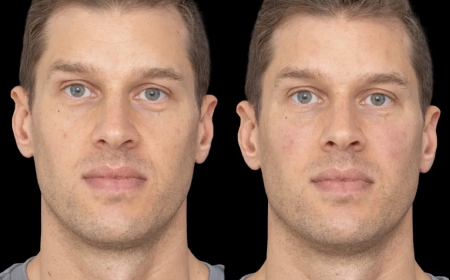Why You Should Visit a Weight Management Doctor Before Starting Any Diet Plan
Rather than jumping into the latest trend, understanding your body’s specific challenges and metabolism can significantly improve outcomes. A weight management doctor provides this essential insight.

The internet is full of diet plans promising fast results, yet millions struggle to lose weight or maintain their progress. The truth is, weight loss is not just about willpower or eating lessit's a complex biological and psychological process. Consulting a weight management doctor before starting any diet plan can help you make informed, sustainable, and safe choices tailored to your individual needs.
The Problem With One-Size-Fits-All Diets
Most fad diets are designed with mass appeal in mind. They dont account for your medical history, body type, hormonal profile, or mental health status. What works for one person might lead to nutritional deficiencies, fatigue, or even weight gain for another.
This is where a weight management doctor becomes a valuable partner. They assess your baseline health and identify any risk factors or conditions that might interfere with popular diets. For example, a high-fat diet like keto may be harmful if you have liver disease or cholesterol issues, while extreme calorie restriction can backfire for those with thyroid imbalances.
What a Weight Management Doctor Evaluates Before Recommending a Plan
Before you begin a new eating routine, a weight management doctor will typically conduct a comprehensive evaluation that includes:
-
Review of medical and family history
-
Current medications and supplements
-
Physical exam
-
Blood tests for thyroid, glucose, and cholesterol levels
-
Hormonal assessments
-
Lifestyle and stress evaluations
-
Mental health screening
This thorough review allows your doctor to understand your metabolism, any chronic conditions, and emotional factors that may affect your ability to lose weight.
Personalized Diet Recommendations
Unlike generalized advice, a weight management doctor creates a diet plan suited to your body chemistry, lifestyle, and preferences. Examples of customized plans include:
-
Low-glycemic diets for individuals with insulin resistance
-
Mediterranean-style eating for heart health
-
High-protein meals to preserve muscle mass during fat loss
-
Plant-based diets for those managing inflammation or digestive issues
These plans are often adjusted regularly based on progress and lab work to ensure your body responds well.
Why Hormones Matter in Weight Management
Hormonal imbalances are a hidden factor behind many failed weight loss attempts. Conditions like hypothyroidism, insulin resistance, PCOS, and low testosterone can all disrupt metabolism and make it difficult to lose weighteven with proper diet and exercise.
A weight management doctor screens for and addresses these imbalances as part of your overall strategy. In some cases, hormonal therapy or medication adjustments may be needed to normalize metabolism and improve your response to dietary changes.
Medication as a Support Tool
In addition to lifestyle changes, your weight management doctor may recommend FDA-approved weight loss medications to help control appetite, improve satiety, or block fat absorption. These medications are not magic pills but can be effective tools when used as part of a comprehensive plan.
Medication is typically considered when:
-
BMI is over 30, or over 27 with a related health condition
-
Youve had difficulty losing weight through diet and exercise alone
-
Cravings or binge eating are hard to control
Your doctor monitors the medications effectiveness and any side effects to ensure safety throughout your program.
The Importance of Mental and Emotional Support
Emotional eating, stress, anxiety, and depression are major contributors to weight gain. A weight management doctor incorporates behavioral support into your plan and may:
-
Offer cognitive behavioral therapy (CBT) referrals
-
Help you identify emotional triggers
-
Provide stress-reduction strategies
-
Suggest mindfulness-based techniques
Addressing the mental and emotional side of weight loss often makes a huge difference in long-term success.
Exercise That Matches Your Needs
Not everyone can do high-intensity interval training or run five miles a day. A weight management doctor assesses your current physical capacity, joint health, and mobility issues before recommending an exercise plan. This ensures you start safely and avoid injuries that could set you back.
Exercise plans often include:
-
Low-impact cardio like swimming or walking
-
Resistance training to build muscle and boost metabolism
-
Flexibility and balance routines
-
Physical therapy referrals if needed
Starting with realistic goals and a personalized routine increases consistency and long-term adherence.
Risks of Starting a Diet Without Medical Guidance
Starting a diet without proper medical evaluation can lead to:
-
Nutritional deficiencies
-
Muscle loss instead of fat loss
-
Hormonal disruptions
-
Fatigue or poor energy levels
-
Digestive problems
-
Worsening of chronic conditions
A weight management doctor helps you avoid these pitfalls by designing a safe plan that supports both weight loss and overall health.
Monitoring Your Progress the Right Way
A weight management doctor doesn't just give you a plan and send you on your waythey monitor your progress to ensure youre moving in the right direction. This includes:
-
Tracking body composition (fat vs. muscle)
-
Checking lab results regularly
-
Evaluating changes in blood pressure, glucose, and cholesterol
-
Adjusting diet or medications as needed
-
Keeping you motivated through plateaus
This proactive approach helps you stay on course and overcome challenges as they arise.
Ideal Candidates for a Weight Management Doctor
While everyone can benefit from expert guidance, you should especially consider seeing a weight management doctor if you:
-
Have a BMI over 27
-
Have a family history of obesity or metabolic conditions
-
Struggle with emotional eating
-
Have multiple failed diet attempts
-
Are taking medications that cause weight gain
-
Experience hormonal imbalances or chronic fatigue
Even if youre only looking to lose a modest amount of weight, medical insight makes a major difference.
Common Myths Debunked by a Weight Management Doctor
Myth: Weight gain is just about calories in vs. calories out.
Fact: Metabolism, hormones, sleep, and stress all affect weight in complex ways.
Myth: Supplements can replace healthy eating.
Fact: Supplements may support a diet, but they are not a substitute for proper nutrition.
Myth: You must exercise intensely to lose weight.
Fact: Moderate, consistent movement often yields better long-term results.
Myth: You have to feel hungry to lose weight.
Fact: Smart eating plans help you feel full while still in a calorie deficit.
What to Ask During Your First Appointment
When meeting with a weight management doctor, its helpful to ask:
-
What tests will be performed to assess my health?
-
How will this plan be adjusted over time?
-
Are there safe medications that might support my goals?
-
How do you address emotional or mental health factors?
-
What are realistic expectations for progress?
This conversation sets the foundation for trust and a productive partnership.
Conclusion
Starting a new diet without a clear understanding of your unique health profile can lead to frustration and limited success. A weight management doctor offers a medically grounded, customized, and supportive approach that goes beyond just cutting calories. With expert evaluation, emotional support, and long-term planning, they help ensure your weight loss journey is not only effective but also sustainable. Before you begin your next diet, consider consulting a weight management doctoryour body and mind will thank you for it.



































